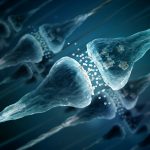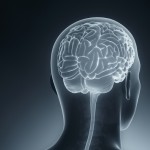News and Announcements
Read the latest news from the Center for Center for Translational Pain Research.
 11.05.2024
11.05.2024Within a few days of injury, scientists can predict which patients will develop chronic pain based on the extent of cross “talk” between two regions of the brain, and the person’s anxiety level after the injury, according to a new Northwestern study.
 08.16.2023
08.16.2023Today, more than 50 million adults in the U.S. suffer from chronic pain — pain lasting longer than three months — and is the most common reason why people seek medical attention, according to the Centers for Disease Control and Prevention (CDC).
 03.20.2023
03.20.2023Feinberg’s chapter of the Alpha Omega Alpha (AOA) medical honor society welcomed 42 new members in a ceremony on March 15, recognizing outstanding educational achievement and significant contributions to medicine.
 01.27.2023
01.27.2023Northwestern Medicine investigators have discovered that specific calcium channels help regulate sex differences in the functioning of immune cells for neuroinflammation and overall neuropathic pain.
 04.26.2022 - The New York Times
04.26.2022 - The New York TimesA better grasp of how chronic pain changes the central nervous system has emerged since Woolf’s experiment. A.Vania Apkarian’s pain lab at Northwestern University found that when back pain persists, the activity in the brain shifts from the sensory and motor regions to the areas associated with emotion, which include the amygdala and the hippocampus. “It’s now part of the internal psychology,” Apkarian says, “a negative emotional cloud that takes hold.”
 10.15.2021 - The Washington Post
10.15.2021 - The Washington PostImaging technology further validates that psychological and emotional factors spur chronic pain. A. Vania Apkarian, who runs a neuroscience pain lab at Northwestern University, predicted with 85 percent accuracy which subjects would develop chronic pain by looking not at their backs but at their brains.
 05.01.2021 - Discover Magazine
05.01.2021 - Discover Magazine“If the placebo response is predictable and persistent, it has all the pieces of being an innocuous way of treating these people,” says A. Vania Apkarian, a neuroscientist and long-time pain researcher at Northwestern University. “It’d be a cheap way to do it. You don't need thousands and thousands of dollars of pharmaceutical industries’ stuff to be put in your body, which always has side effects.”
 04.27.2020
04.27.2020Ben Smith, a second-year medical student, led a study that found opioid prescriptions declined significantly between 2013 and 2018 in the Northwestern Memorial Hospital Emergency Department.
 01.20.2020 - The Wall Street Journal
01.20.2020 - The Wall Street JournalVania Apkarian, director of the Center for Translational Pain Research at Northwestern University Feinberg School of Medicine, studies which patients respond to placebo. In a 2016 study in the journal PLOS Biology, he used brain scans to identify the regions in the brain that can predict a response to placebo in 56 chronic knee osteoarthritis pain patients compared with 20 control patients. He replicated the findings in a 2018 study in Nature Communications with 63 chronic-back-pain patients.
 01.06.2020
01.06.2020Feinberg has had an exceptional year in 2019, from scientific advances to the development of breakthrough therapies and treatment strategies, as well as continued excellence in educating the next generation of medical leaders.
 11.08.2019
11.08.2019Northwestern has formed the Center for Translational Pain Research, which aims to advance basic and clinical science in the hopes of developing non-addictive treatments for chronic pain.
 09.17.2018
09.17.2018Scientists have shown they can predict which chronic pain patients will respond to a placebo pill based on brain anatomy and psychological characteristics.
 10.31.2016
10.31.2016New research from Northwestern Medicine and the Rehabilitation Institute of Chicago scientists has identified the brain region responsible for the placebo response to pain.
 05.19.2016
05.19.2016Certain anatomical properties of the brain – not the initial injury – determine most of a patient’s risk of developing chronic pain, according to a new study.
 12.21.2015
12.21.2015A brain region controlling whether we feel happy or sad, as well as addiction, is remodeled by chronic pain, according to a new Northwestern Medicine study, and a new treatment targeting this region may dramatically lessen symptoms.
 11.06.2014
11.06.2014Northwestern Medicine scientists mapped brain circuitry associated with addiction and reward, and found that smoking affects the way the brain relates and responds to pain. The findings could lead to targeted therapies for chronic pain sufferers.
 09.18.2013
09.18.2013In a study published September 16 in the journal Pain, A. Vania Apkarian, PhD, found that abnormalities in brain axons predispose people to chronic back pain after injury.
 12.30.2009
12.30.2009Faculty members at the Feinberg School of Medicine frequently are quoted or featured in national and/or international news stories.
 10.30.2009
10.30.2009Faculty members at the Feinberg School of Medicine frequently are quoted or featured in national and/or international news stories.
 03.10.2009
03.10.2009Chronic Pain Reorganizes the Brain Dr. Marco Martina Studies of people suffering from chronic pain have shown that depression and specific cognitive declines are associated with the condition. In humans, the prefrontal cortex is known to be important in higher-order cognitive and emotional functions, and a subsection, the medial prefrontal cortex, has been correlated with […]
 06.01.2007
06.01.2007June 4, 2007 Contact: Marla Paul at (312) 503-8928 or atmarla-paul@northwestern.edu Broadcast Media: Tamara Kerrill Field at (847) 491-4888 or attlk@northwestern.edu Old Memory Traces in Brain May Trigger Chronic Pain, as Newly Identified Drug Relieves Suffering CHICAGO—Why do so many people continue to suffer from life-altering, chronic pain long after their injuries have actually healed? […]
 11.01.2004
11.01.2004November 23, 2004 Chronic Back Pain Shrinks ‘Thinking Parts’ of Brain CHICAGO—Chronic back pain, a condition afflicting many Americans, shrinks the brain by as much as 11 percent—equivalent to the amount of gray matter lost in 10 to 20 years of normal aging, a Northwestern University research study found. Loss in brain density is related […]